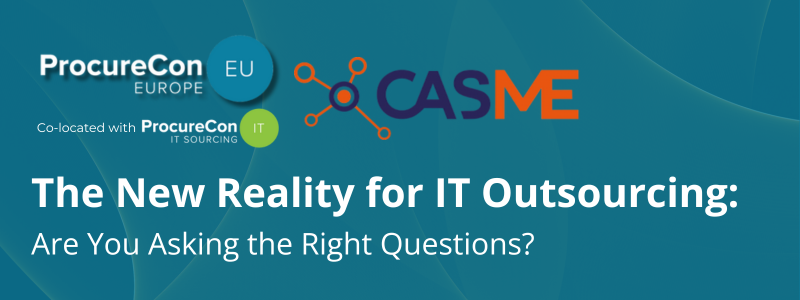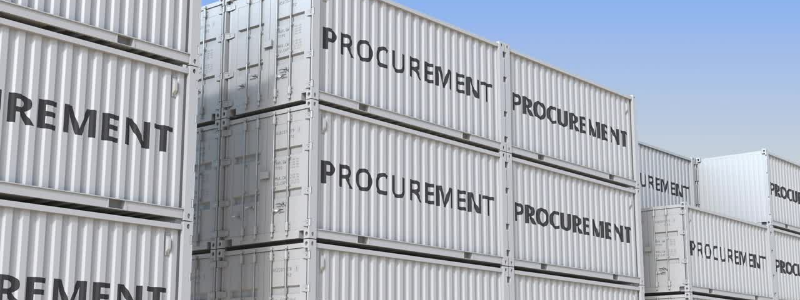ProcureCon 2026 Blog
ProcureCon Europe Exclusive: Insights on Negotiation with Giuseppe Conti

At 2025's ProcureCon Europe event in Vienna, Graham Crawshaw from CASME caught up with Giuseppe Conti, founder of Conti Advanced Business Learning, to talk about his new book on negotiation and the wealth of experience behind it.
The New Reality for IT Outsourcing: Are You Asking the Right Questions?

Procurement leaders across Europe now face outsourcing decisions that directly influence business agility, resilience, and competitiveness. The question is not whether to outsource, but how to make outsourcing work as a strategic enabler rather than a transactional fix. CASME’s global procurement community shared their motivations for IT outsourcing and preferred models.
From Chaos to Clarity: How GenAI Is Redefining Procurement

We sat down with Christoph Kunel, Chief Product Officer at Crowdfox, ahead of ProcureCon Europe 2025, to explore how generative AI is transforming procurement from complex, fragmented processes into seamless, intelligent workflows that deliver real business value.
How to Win the War for Talent in Procurement

Concentrating on retention and upskilling but This alone will not solve the problem. To stop employees from shopping around for other opportunities, more has to be done than ever before. (Spoiler alert: It is not just higher pay).
Exclusive survey reveals: 91% of CPOs report increased C-suite influence

A recent survey reveals procurement’s strategic role has increased significantly. According to the ProcureCon CPO report, 91% of respondents reported an uptick in the CPO’s role in C-suite decision-making over the past two years. However, challenges remain, as 46% are facing internal struggles.
How can procurement become the best version of itself?

The procurement function has undergone a sizable transformation in recent years, moving beyond a mere cost-saving function to having an important role in an organisation's strategy. While traditional frameworks have provided stability in a time when that has been in short supply, procurement now has the opportunity to redefine its role even further by fostering innovation, prioritising sustainability, and developing strategic partnerships to drive value creation throughout the supply chain.
What Macroeconomic Threats will CPOs Have to Navigate in 2024?

Global supply chains are becoming more complex year on year, which means that technically, CPOs are tasked with managing the most complex global supply chains to ever exist. With that challenge comes unwanted impacts from various macroeconomic trends that make this task even more complicated.
The Flagship Procurement Event to Benchmark Your Strategy with the World’s BIGGEST Companies

Take a look at the round up of ProcureCon Europe 2023!
The Ultimate Guide to Sustainability in Procurement

In an era where environmental sustainability is paramount, procurement departments must lead the way in reducing greenhouse gas emissions. A comprehensive report sheds light on the challenges CPOs face and offers essential insights for success in the ESG landscape. Discover the full findings today and embark on the journey towards a more sustainable future.
Procurement: The Cornerstone of Achieving Sustainability Goals for Organisations

In an age where environmental concerns take centre stage, the significance of sustainable practices for organisations cannot be overstated. Among the myriad strategies employed to foster sustainability, procurement emerges as a pivotal player. It's not merely about sourcing products and services; it's about orchestrating a profound shift towards responsible consumption that echoes across industries and generations. Let's delve into why procurement is the linchpin for organisations aiming to attain their sustainability goals.
Navigating the Future of Public Contracts: Understanding the UK's Procurement Bill

With the procurement bill making its way through UK Parliament, we take a look at how it works, when it will come into effect and what it means for UK businesses
Ciaran Owens from Imperial Brands on procurement being commercially minded, sustainability and navigating Germany’s Supply Chain Due Diligence Act

We sat down with Ciaran Owens from Imperial brands to talk about making procurement more commercially minded, sustainability and Germany's Supply Chain Due Diligence Act
What is the German Supply Chain Due Diligence Act?

Germany has recently passed their Supply Chain Due Diligence Act, which will have far-reaching ramifications for organisations around the world. Here, we discuss what the act is, and what it means for you.
How CPOs at Nestle, IBM, Radisson Hotels and DPDHL are keeping their seat at the decision-making table

In 2023’s ProcureCon Playbook, we gathered insights from procurement leaders to better understand how their role has changed, how they continue to demonstrate value to their organisation - and keep the seat that they worked so hard to get.
What Jeremy Hunt’s Spring Budget means for procurement

Jeremy Hunt unveiled his first Budget since becoming Chancellor of the Exchequer. Here are some of the ways the procurement industry will be affected and how business leaders are reacting
How supplier collaboration is driving innovation in procurement

Procurement leaders are turning to supplier collaboration to drive innovation, reduce costs, and achieve sustainability goals. Supplier collaboration also plays a crucial role in achieving net-zero CO2 emissions, prioritising diversity and inclusion, and addressing the digital skills gap. CPOs should prioritise building relationships with suppliers, hiring top talent, and investing in training to remain competitive.
Prioritising Sustainability in Procurement

CPOs are at the forefront of addressing the environmental impact of their organisations. By working to find the most sustainable suppliers, they can meet their own CSR and ESG objectives and ensure their firms are meeting their customers’ sustainability demands.
Digital Innovation for Procurement

Innovation has always been important for heads of procurement, but in times of economic uncertainty, it is more crucial than ever. Investing in more eProcurment tools and automation technology can help CPOs drive supplier collaboration, increase innovation, and strengthen supply chain resilience.
Expert Interview with … Thomas Roemer, Covestro

We had the pleasure of chatting to Thomas Roemer, Chief Procurement Officer at Covestro ahead of his appearance as a speaker at ProcureCon EU 2022, about the best opportunities for procurement to add value right now.
Expert Interview with … Gonzalo Zabala Peláez, Stellantis

We had the pleasure of chatting to Gonzalo Zabala Peláez, Procurement Centre of Excellence Director at Stellantis ahead of his appearance as a speaker at ProcureCon EU 2022, about the best opportunities for procurement to add value right now.
Tesco is Leveraging the Power of Railways for Supply Chain Resiliency

To help combat the ongoing supply chain issues from the pandemic, Tesco has turned to the UK’s railway network.
AB InBev is Looking to Startups to Strengthen Supply Chains

To help make supply chains more resilient for the future, AB InBev knew it needed to find the best and brightest minds around.
Aviva on How Decarbonisation Makes Supply Chains More Resilient

We all know how important decarbonising the supply chain is as part of the ongoing fight against global climate change. However, British multinational insurance brand, Aviva also argues it will make them more resilient in a new investor report.
Supply Chain Resilience

The global COVID-19 crisis has brought supply chains front and centre. People who may not have even previously heard the term, although were probably unconsciously familiar with the concept, now have a greater understanding of how critical these networks are to modern society.
Expert Interview with … Javier Caravantes, SegurCaixa Adeslas

We had the pleasure of chatting to Javier Caravantes, Chief Procurement Officer at SegurCaixa Adeslas ahead of his appearance as a speaker at ProcureCon EU 2022, about the challenges in procurement right now and the importance of sustainability initiatives.
BP is Levelling the Playing Field for Neurodiverse People

As part of its Empowering Futures project, energy giant, BP is making sure it devotes time and resources to growing its pool of neurodiverse talent.
AB InBev is Deploying Data to Manage Its World Class Talent Portfolio

As we are all aware by this point, data is the lifeblood which keeps modern global industry moving – and talent management is no exception.
Lloyds Bank has Set Up a Virtual HQ to Let Graduates Explore Career Options

One of the best ways companies can fight back against the global talent crisis is to target young people while they are still exploring their career options.
Investing in Your People

Digital transformation has been a huge deal in procurement in recent years as organisations leverage the power of digital technology to make their purchasing departments run more smoothly and effectively than would otherwise be possible.
BP is Seeing the Benefits of Supplier Diversity with a Slew of Awards

Ever since the establishment of the US Diversity, Equity and Inclusion Framework for Action, energy giant, BP has been committed to diversifying its supply chain and promoting a culture of inclusivity, equity, and diversity across its entire operation.
Tesco is Winning Awards for Its Use of Augmented Reality in Supplier Auditing

If a brand wants to have a diverse chain of suppliers from which to acquire the goods it needs to perform its core function, it must have a way to vet and audit those suppliers in as streamlined and effective a manner as possible.
Diageo Launches Value Chain Inclusion and Diversity Framework

British multinational beverage alcohol company, Diageo launched its Society 2030 plan – a 10-year action plan to help create an inclusive and sustainable world – which includes a commitment to doubling its global spend with diverse owned and operated businesses by 2025.
Why Supplier Diversity is Critical to Modern Procurement

Most people and organisations believe that creating a fairer and more diverse and equitable world is a worthy cause and that promoting these ideals has far reaching benefits, both in terms of societal harmony and economic success.
BP is Smartly Architecting Better Outcomes for the Business and Creating More Holistic Value

For the longest time, procurement has been heavily focussed on generating value to an organisation by reliably sourcing items at the best possible price. However, Procurement Vice President for Digital & Talent Supply at integrated energy company BP plc, Mark Smith has a bigger vision.
IKEA Procurement is Taking Serious Steps to Address the Sourcing Issues at the Retailer

Swedish furniture retailer, IKEA has not been having an easy time of things in the UK of late. Reports that the British arm of company is struggling to procure up to 1,000 product lines abound and the pressure doesn’t seem to be letting up anytime soon.
Tesco Upgrades Profit Forecast and Credits Supply Chain as Significant Contributor

As one of the world’s largest retailers, supermarket giant Tesco has the people in resources in place to meet almost any challenge. However, the COVID-19 crisis tested the company’s ability to whether such situations to breaking point.
Measuring Procurement’s Impact on the Business

As you can see from this month’s featured news stories, procurement has the potential to have a wide and far-reaching impact on the organisation as a whole, whether that be through making environmentally conscious purchasing decisions or freeing up budget through frugal spending.
HSBC is Helping Students Advance Their Career with Digital Technology

With digital technology advancing at such an alarming rate, it can be difficult for brands to find people with the skills they need to make the most of these innovations.
Unilever Names New Supply Chain Chief in Management Shakeup

From April 2022, customer goods giant, Unilever will have a new leader driving its supply chain operations out of the COVID-19 pandemic and beyond.
Procurement Analysis at Tesco – Hearing from the Experts

With procurement suffering something of a skills gap these days, many companies are searching for ways to inspire a new generation of professionals to consider a career in their purchasing arms.
Advancing Your Procurement Career

When it comes to advancing your career in any field, it can be difficult to know which way to turn. It’s also amazingly easy to succumb to inertia and remain static in your career – how many of us have had a job which we swore would be for a few months only to blink and find a year has disappeared?
Ikea is Combatting the Australian Labour Shortage and Giving Refugees a Leg Up

As the global labour shortage in industries such as hospitality and retail continue, Ikea Australia has come up with a unique strategy to encourage more workers to take up positions at the famous Swedish furniture store.
Here’s How Deutsche Telekom is Attracting More Staff with #Playyourday

To try and bring more technology enthusiasts into the fold Deutsche Telekom has launched a new campaign which lets visitors to its special website play through a choose your own adventure type video.
BP is Encouraging Flexible Working in the Post-Pandemic Marketplace

Many brands the world over have had to adjust the way they facilitate work in order to remain relevant and productive during the global COVID-19 crisis. Perhaps the most notable of these transformations has been the shift to more flexible working patterns.
Contingent Labour Strategies for a Post-Pandemic World

The COVID-19 crisis has transformed the very nature of work and in few spaces is this evolution more noticeable than in the field of contingent labour. As people has got more used to a flexible and remote working pattern during the pandemic, many are looking to continue working in this manner, a fact which has caused a boon in the number of contingent staff now available for sort-term and temporary employment opportunities.
Rethinking Procurement Contract Payment Terms

As a procurement officer, your main motivation is to make sure the goods and services your organisation needs to function are acquired in a cost effective and timely manner, while your suppliers need to get paid for facilitating their side of the arrangement.
Unilever is Asking Suppliers to Sign Up for Responsible Sourcing

Responsible sourcing is very much a hot button issue in the procurement business today. With supply chains become inexorably more global and complex, the opportunities for unethical practices to inadvertently find their way in have also grown in number.
How Vodafone is Pushing Supplier Collaboration

Vodafone is joining forces with fellow telecommunications provider BT to promote supplier collaboration within the industry.
Tesco is Keeping Contracts Flexible to Fight Food Waste

The sudden transformation of the UK weather – I know, shocking, right? – from a wet and cold spring to a scorching hot summer led to a sudden influx of delicious British strawberries.
AB InBev is Cutting Supplier Emissions for Its Budweiser Brand

As one of the world’s most famous beer brands, Budweiser and its parent company AB InBev, the world’s largest brewery, are more than aware of their responsibilities when it comes to reducing the impact of their business operations on the planet and are putting sustainability at the heart of their procurement strategy.
Procurement as the Sustainability Business Leader

Few can deny the clear impact manmade climate change is having on the planet. It seems barely a day goes past before we are reading about some new extreme event, be it wildfires, earthquakes, hurricanes, flooding, or some other ecological disaster
Volvo is Deploying Blockchain Technology to Ensure a Sustainable Battery Supply

While the switch to electric vehicles undoubtedly represents a net good when it comes to human impact on the environment, there is one element of their manufacture which is not without its share of controversy – the batteries.
Can Toyota Afford to be “Lean” in the Post-COVID World?

It feels like forever ago when we were championing Toyota as an innovator of lean manufacturing. The Japanese car manufacturer had pioneered a new way of keeping business waste to a minimum with its seven lean principles - overproduction, unnecessary transportation, inventory, motion, defects, over-processing, and waiting.
Samsung Biologics on Securing Supply Networks in the Wake of COVID-19

While research and development groups often prioritise factors such as creativity and thinking outside the box when it comes to choosing supply partners, there is often a lot more to be said for longevity and experience. It’s all very well having lots of superficially good ideas, but many procurement departments want to know those ideas have been stress tested in the real world.
Bureau Veritas and Shell Complete Supply Chain Resilience Pilot Project

Fuel supply chains have been hitting the news for the last week or so as UK petrol stations struggle to meet demand. Labour shortages caused by post-Brexit immigration regulations have been largely blamed for the situation as motorists up and down the country find prices being driven up and pumps running dry.
Reassessing Supply Chain Resilience and Performance in a Post-COVID Landscape

It’s fair to say that the COVID-19 crisis caught supply chains off guard and has really served to expose some of the weaknesses inherent in the way we used to carry out our business. However, failure is nearly always an opportunity for learning, so let’s have a quick look at how we can dust ourselves off and improve for the future.
A Strategic Restructuring Of Procurement For A Post-COVID World

IT procurement protocols are vitally necessary for any organisation that seeks to protect budgets and achieve value. However, when the COVID-19 pandemic subjected supply chains in all sectors to levels of stress never before experienced during 2020, tensions between IT buyers and procurement teams were heightened. With restrictions in supply and the suspension of air and sea freight, Heads of IT procurement were often faced with the prospect of having to buy products that were massively over specified, simply because that was all that was available.
Gartner and GenZ are Driving Supply Chain Digital Transformation

With GenZ now taking up a significant portion of the global workforce, they are driving massive change when it comes to the digital transformation of procurement and other supply chain industries.
The UK Government’s Green Paper For Transforming Public Procurement

The UK Government has found itself under intense criticism and scrutiny for the way it has handled PPE and medical equipment procurement during the COVID-19 pandemic and a new Green Paper is seeking to completely overhaul the processes which underly public procurement.
COVID-19 is Leading to Intelligent Automation Implementation

Artificial intelligence has been steadily progressing for some time now, transforming from a term largely associated with video games and science fiction to an integral part of almost every industry known to man.
Reinvigorating People and Processes in the Wake of COVID and Brexit

It’s been quite the couple of years for procurement and the rest of the supply chain industry in the UK. Not only have we had the global crisis of the COVID-19 pandemic to deal with, but also had its challenges augmented by the challenges of our withdrawal from the European Union.
Nintendo isn’t Playing Around When It Comes to CSR

Japanese gaming and toy giant Nintendo is no stranger to corporate social responsibility (CSR). It was barely a decade ago when President Satoru Iwata announced announced he and the board of directors (including legendary Mario creator, Shigeru Miyamoto) would be cutting their salaries by up to 50% in the wake of the company’s declining profits, rather than making staff redundant.
Lenzing Group is Winning Awards for CSR

EcoVadis has recently awarded Austrian cellulosic fibre producer, Lenzing Group its platinum award for corporate social responsibility.
The assessment carried out before the awards are decided includes an evaluation of each organisation’s working conditions, human rights commitment, environmental impact, as well as ethics and procurement sustainability.
Maple Leaf Foods named Top Canadian Company for CSR

The CSR Journal has recently named Canadian consumer protein brand, Maple Leaf Foods at the top of its Top Companies for CSR in Canada list. The Mississauga, Ontario-based company makes high quality food products under brands including Maple Leaf Prime, Schneiders, Mina and Field Roast Grain Meat Co, and has always been dedicated to acting in a manner which reflects a strong belief in corporate responsibility.
New Frontiers in Procurement-Driven CSR

Corporate social responsibility is a big deal in the modern procurement industry. Modern consumers have more information at their fingertips than ever before, and they have no qualms about drilling down into a company’s operations and basing a purchasing decision on how that company behaves throughout its entire network.
Optimising eProcurement and Data Analytics

While some businesses still rely on the old reliable telephone to contact suppliers and place orders, more and more organisations are coming around to the benefits of eprocurement and data analytics.
eProcurement – Samsung’s Sourcing Transformation

Recently, Samsung identified that its sourcing arm had emerged as a critical area which was ripe for modernisation and decided to work with award-winning sourcing software vendor Keelvar to revolutionise it through eprocurement optimisation.
How Nestle is Using Blockchain for Procurement Transparency

One of the disadvantages of being able to enjoy the wide range of exotic foods available to us these days is that we’ve never been farther from the source of our produce. Gone are the days when we used to get all our food from the local butcher and greengrocer, with modern supermarkets and food brands sourcing ingredients from all over the globe.
Toyota Takes Procurement Into the Future

Japanese car brand Toyota has always ridden in the vanguard of innovative thinking when it comes to the way it operates. It was Toyota which first introduced and proliferated the concept of...
Innovating Supplier Collaboration

Nothing gets done without supplier collaboration. As a professional in the supply chain business, you know all too well that there is not a single industry in the world that can survive without establishing and maintaining a solid relationship with suppliers.
However, even in this most basic and fundamental of business relationships there is room for innovation.
How Samsung has Supported Its Suppliers During the COVID-19 Pandemic

The global COVID-19 pandemic has been devastating for many industries, but those businesses responsible for essential supply chains have had a particularly tough time of it. However, electronics giant Samsung has been innovating with its suppliers and making sure they would still be around to support its business operations for many years to come.
How Shell has Crafted a Collaborative Platform to Help Suppliers Reduce Emissions

The biggest news in the energy industry today is the so-called “Energy Transition,” which is seeing some of the world’s biggest corporations joining in the massive undertaking of making the switch from fossil fuels to renewable energy.
Volkswagen is Leading the Auto Industry in the Biggest Data Exchange It’s Ever Seen

When it comes to innovating in the field of supplier collaboration, the ultimate goal is to have every link in an industry’s value chain working harmoniously with one another and all singing from the same hymn sheet.
60 seconds with...Antònia Solà, Ecolab

We had the pleasure of chatting to Antònia Solà, Procurement PMO EMEA Lead at Ecolab, about the lessons learned from the pandemic, the importance of risk management and what the future holds for procurement.
How Daimler’s New Product Lines And Procurement Mix Are Fuelling A Confident And Profitable Start To 2021

In the words of Ola Källenius, Chairman of the Board of Management of Daimler AG and Mercedes-Benz AG, “The year 2020 was a stress test for just about every company in almost every industry.”
Procurement In The Lead: Capitalising on Your Increased Visibility
Over the past twelve months, many businesses have had to act with agility and flexibility in order to keep their essential operations going, in the light of radical supply chain disruptions due to the COVID-19 pandemic. Once crisis management brought relative stability, they had to pivot again as they adapted to new trading conditions or changing customer needs.
Sustainable Procurement Practices And Innovation Are Helping Toyota Meet Its Challenge 2050 Goals

Reducing carbon emissions, conserving water, fostering a sustainable supply chain including waste reduction, and protecting biodiversity are four key areas charting Toyota’s progress on Challenge 2050 in North America, an annual North American Environmental Action Plan in line with targets of the United Nations Sustainable Development Goals (SDGs).
60 seconds with…Tjarda Becker, FrieslandCampina

We had the pleasure of chatting to Tjarda Becker, Global Director of Direct Materials Procurement at FrieslandCampina about the impact of Covid-19, the new opportunities created and the importance of agility in the Supply Chain.
60 seconds with…Réda Guiri, Toyota Insurance Management

We had the pleasure of chatting to Réda Guiri, Procurement Director, EMEA at Toyota Insurance Management, about the lessons learned from the pandemic, new opportunities for procurement and what pre-Covid practices he doesn't want to see return.
Adapting And Rethinking Supply Chain Strategies For New Realities

The worldwide health, social, and economic upheaval due to COVID-19 has left supply chain management in an uncertain atmosphere in which the ability to rapidly redesign the supply chain and mitigate risk are now critical to the survival of business organisations. Though risks and challenges plague the supply chain there are opportunities too -- and Chief Procurement Officers must now consider how best to exploit them and remain agile, so as to stay ahead of future uncertainties.
Procurement Risk Management: Opportunities And Challenges During COVID-19 Transition

Although vaccine roll out is giving businesses some optimism for a return to more stable conditions by the second or third quarter of the year, the legacy of COVID-19 disruption persists into 2021. The response of procurement has largely been to lend support to critical business operations and bolstering relationships with suppliers, and to focus on spend cost reduction and the capture of non-price value from supplier relationships.
Volkswagen Deploys Worldwide Logistics Teams To Help Mitigate Procurement Risk In The Wake Of COVID-19

During the course of the COVID-19 pandemic, supply chain risk has been increasing globally, with organisations struggling to meet the demand even for commodities that were once considered commonplace and inexpensive.
Nestlé Works To Provide Nutrition And Food Security Across The Globe

Food security and nutrition are as much a part of the COVID-19 relief and management effort as drug treatments, or measures for cleanliness and sanitisation.
How ExxonMobil Encourages Supplier Participation And Promotes Diversity

As part of its procurement process and protocols for supplier qualification, ExxonMobil trains procurement staff to conduct pre-qualification assessments, to help establish a supplier’s capacity to provide the required materials or services.
AXA Embraces Remote Work In Its Global Strategy
On Jan 19, 2021, AXA announced the extension of its smart working strategy to all of its entities worldwide. The strategy aims to implement a hybrid way of working, which combines remote work and office presence.
Influencing The C-Suite In The Light Of Procurement’s Newly Elevated Position
In recent years, trends such as globalisation and increasing levels of digital transformation have been forcing changes in the ways that organisations operate, and manage their lines of acquisition and supply. Such developments have served to emphasise the important role that procurement plays in enterprise operations.
Q&A with Andy Horne, Head of Supply Chain at EDF

We sat down with Andy Horne, Head of Supply Chain at EDF to find out more about how procurement teams have been dealing with the pandemic.
Q&A with John Jordan, Head of Strategy Planning at Sony

We sat down with John Jordan, Head of Strategy Planning at Sony to find out more about how procurement teams have been dealing with the pandemic.
Google and Other Tech Giants are Moving Operations out of China

The inexorable onslaught of the coronavirus pandemic has caught much of the world off guard. Here in the UK, the reporting of the virus went from “Oh, it’s another one of these” to a nationwide lockdown in what seemed like the blink of an eye.
Airbnb, Alibaba, and Netflix are Adjusting Their Operations, and Disseminating Information

In terms of physical health, social consequences, and economic impact, the ongoing pandemic of 2019 novel coronavirus or COVID-19 is having various effects on institutions across the globe.
Uber, Shell and Disney are Offering Free Services, Donating Food, Money, and Protective Gear, and Keeping People Informed

The clinical, logistical, and social challenges imposed by the 2019 novel coronavirus (COVID-19) pandemic are being felt by organisations in every sector of commercial life.





